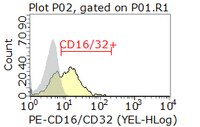Independently ligating CD38 and Fc gammaRIIB relays a dominant negative signal to B cells.
Oliver, AM; Grimaldi, JC; Howard, MC; Kearney, JF
Hybridoma
18
113-9
1998
Zobrazit abstrakt
CD38 is expressed on a variety of hematopoietic cells and has a unique enzymatic activity that converts nicotinamide adenine dinucleotide (NAD) into cyclic ADP-ribose (cADPR) and then into ADPR. CD38 is expressed at increasingly higher levels on B cells at each stage of B cell differentiation, and is then down-regulated on germinal center B cells and mature plasma cells. Crosslinking of CD38 on the surface of mature, resting B cells induces B-cell proliferation, which is enhanced by co-signals such as IL-4 and LPS. CD38-induced proliferation is abrogated by Fc gammaRIIB ligation and this inhibition can be effected by the addition of anti-Fc gammaRII Ab midway through a 48 h in vitro culture indicating that it delivers a potent negative signal to CD38 activated B cells. The suppressive signal was shown to occur through the Fc gammaRIIB because CD38-induced B-cell activation was not inhibited by the ligation of Fc gammaRIIB in Fc gammaRII-deficient B cells. These results indicate that Fc gammaRIIB can act as a regulatory molecule that modulates CD38 signals in vivo. | 10380010
 |








